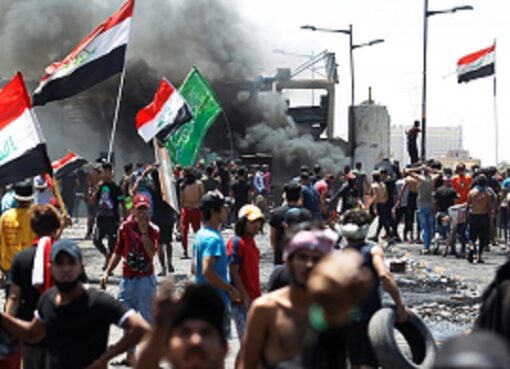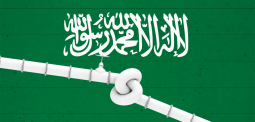Since 2003, Iraq has not seen the type of upheaval it witnesses today. Could it lead to genuine political change?
In October 2018, when Adel Abdul Mahdi was named prime minister of Iraq, there was widespread optimism both domestically and internationally that the new government he would lead would be able to move the country forward. A little more than a year later, he had to resign after a violent crackdown on protests by security forces and armed militias left hundreds dead and thousands injured.
Since early October, mass demonstrations have been held to demand an end to corruption, better living conditions, independence from regional (mainly Iran) and global (mainly the United States) powers, and the downfall of the entire political system that has been in place in Iraq since the 2003 US invasion.
Although the protests have largely been confined to Baghdad and the Shia-majority areas in central and southern Iraq, the protesters’ demands have not been sectarian. And unlike the previous waves of protest movements in Iraq, the current upheaval has been characterised by strong public will, popular agency and belief in the power to change. Importantly, none of the Iraqi parties has been able to coopt the demonstrations.
In addition, protesters have defined their movement as an ”uprising” or a ”revolution”, which is challenging political legitimacy and current state-society relations. In parallel, they have also labelled the Iraqi authorities as “the regime”, a word with clear ramifications for the people of this region referring to an authority with no popular support or legitimacy.
What is happening in Iraq is truly remarkable and cannot be compared with any other moment in its recent history. So what got the country to this moment and what happens next?
The roots of an uprising
Chronic and growing dysfunction in three sectors – government, economy and security – is at the heart of the current upheaval in Iraq.
On the political level, the post-2003 system in Iraq is centred on a power-sharing arrangement among the country’s three largest ethno-sectarian groups: Shia Arabs, Sunni Arabs and Kurds. According to this informal agreement, the prime minister’s post is reserved for a member of the Shia community, the parliament speaker has to be a Sunni, and the president – a Kurd.
On the ground, this system has constrained attempts for meaningful political and administrative reform. As Nechirvan Barzani, president of the semi-autonomous Kurdistan Region of Iraq (KRI), noted recently, the political blocs representing Iraq’s three main components have been more interested in their respective constituencies and party politics, than working for the good of the country.
The result is a weak government and a weak prime minister who do not have the full support of political parties and are therefore unable to counter corruption and pursue good governance.
Another weak point of this system is that it has not really allowed for genuine power-sharing. Political power has remained in the hands of dominant Shia actors and has left some groups deeply dissatisfied.
The protests of 2012-13 in Sunni-majority areas, which rejected the perceived sectarian rule of former Prime Minister Nouri al-Maliki and the KRI’s 2017 referendum on independence were signs that this system has not been able to create a sense of equal partnership. The continuing protests in Shia-majority areas demonstrate this system does not satisfy the Shia population either.
On the economic level, the country’s continued dependence on its oil resources has prevented sustainable economic development, which, together with the high level of corruption and public mismanagement, has led to the failure of the state to provide for the basic needs of the population.
Successive governments have tried to placate the Iraqi public by expanding the public sector to provide employment for the youth; today two-thirds of the Iraqi budget goes towards paying salaries of government employees. This approach has proven unsustainable and has prevented any real effort being put in diversifying the Iraqi economy and boosting the private sector.
On the security level, Iraq faces major challenges because it does not have unified security and military forces. In addition to the Kurdish Peshmerga and security forces, which operate in a state-within-a-state system and themselves are split along Kurdish party lines, there is a multitude of different forces within the security sector which are not immune to politicisation.
In addition, since 2003, there has been an ever-growing number of militias and armed groups which have wielded significant power within the country and have been instrumentalised by various domestic and foreign powers to pursue their own political interests.
The lack of a unified security force or a “command and control” structure in Iraq’s armed and security forces has weakened the country, giving space for terrorist groups to proliferate and foreign interference to grow.
What is next?
Today, Iraq finds itself in a major crisis with no clear way out. The Iraqi people have demonstrated that the political elite has lost all popular support and legitimacy. Even religious leaders and institutions, such as Iraq’s most senior Shia Muslim leader, Grand Ayatollah Ali al-Sistani, which have been unable to unify the Shia parties, are now facing serious criticism.
The problem is, while there is a clear legitimacy vacuum, political actors and militias continue to insist on maintaining their hard power through systems of political and sectarian patronage. These same political actors are also supposed to select a new prime minister and vote on reforms.
So at this point, there seem to be at least two possible scenarios for what happens next.
First, political blocs could agree on a new prime minister who would remain in his post until new elections are held. His mandate would also include passing a new electoral law to satisfy one of the demands of the protesters.
However, given the current makeup of parliament, which lacks a clear partisan majority, the new prime minister will have to be a consensus figure again – ie he would not be able to wield any more power than Abdul Mahdi did. Hence, his attempts to push forward a new electoral law or any reform could be sabotaged by various political blocs.
And as no major party is ready to concede power or position, it is likely they would seek to influence the next elections. Therefore, It is unlikely that this outcome would satisfy the protesters who will likely continue with their anti-government activity.
Second, the parties may not be able to agree on a new prime minister or may clash over the elections, and this could lead to an internal conflict.
Unlike Syria, Iraqi protesters have not resorted to arming themselves, despite the vicious crackdown on their demonstrations. Thus any escalation would be most likely the result of a conflict between Shia armed groups, such as Muqtada al-Sadr’s Peace Brigades on one side and the Iranian-backed groups of the Popular Mobilisation Units (PMUs). There are already signs of growing hostility between these groups.
Such a scenario would likely open the scene for even more foreign interference, especially from Iran and the US.
A third scenario – where the demands of the people for radical change are fulfilled – unfortunately, seems unlikely. Vested interests of the main domestic and foreign political actors constitute a big enough force to counter the revolutionary spirit of the streets.
Despite the challenges, popular mobilisation, especially among the youth, has become an important factor in Iraqi politics which is forcing a change in the public discourse on legitimacy. Political actors now face a new political reality and they will have to change their approach to their electorate as pressure from the streets continues.
While the “downfall of the regime” will not happen in Iraq, as protesters desire, slow and incremental change in the long term is a significant possibility. The delay of the process and the piecemeal concessions the political elite is likely to give at first will not satisfy the protest movement, which could serve as fuel for continuing popular mobilisation. If Iraq manages to preserve peace, political change could eventually come around.
(*) Kamaran Palani is a Lecturer in International Relations at Salahaddin-University-Erbil.
The views expressed in this article are the author’s own and do not necessarily reflect Al Jazeera’s editorial stance.
Source: Aljazeera, December 24, 2019
https://www.aljazeera.com/indepth/opinion/iraq-unique-crisis-191224094929411.html








Comment here